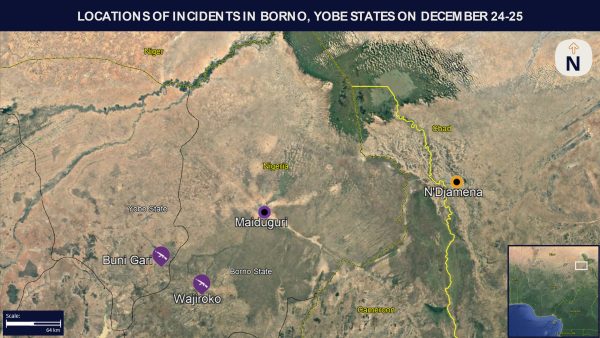27
Dec 2024
9:53 UTC
Nigeria Alert: Security forces foil militants’ alleged UAV attack on army base in Buni Gari, Gujba LGA, Yobe State, per December 26 reports
Current Situation
- Reports from December 26 indicate that the security forces UAV allegedly foiled an unmanned aerial vehicle (UAV) attack by suspected militants over an army base in Buni Gari, Gujba Local Government Area (LGA), Yobe State on December 25.
- Soldiers reportedly sighted the UAV moving towards the army position with an explosive payload attached to it and neutralized it. An explosive disposal team then safely detonated the attached explosive. No one was harmed during the incident. A surveillance drone was subsequently deployed to scan the area, with no other UAVs or aerial threats detected.
- Separately, unconfirmed reports citing an undisclosed security source claim that at least five soldiers were killed in a suspected militant UAV attack on a security position in Wajiroko, Damboa LGA, Borno State on December 24.
- As of writing, no militant group has claimed responsibility for either of the incidents. The incidents have also not been widely reported by independent sources, with most reports citing similar undisclosed military sources.
Source: Punch
Assessments & Forecast
- The latest incidents are highly notable, given that despite entrenched militancy in northeastern Nigeria, they represent among the first known incidents of militants employing UAVs to carry out attacks in the region. To that end, the attacks represent a seemingly new dimension to the general militant modus operandi. However, the details of the attack suggest that the UAVs employed in the attacks are not sophisticated weaponry. The security forces’ neutralization of the UAV over Buni Gari, and the subsequent safe detonation of an attached explosive reveals the improvised nature of the assembled device. Therefore, the device was likely a commercial UAV with an explosive separately attached to it and a mechanism to drop it over a chosen target. This aligns with similar tactics employed by other armed non-state actors in Africa, seeking to enhance their operational capabilities by acquiring some sort of aerial offensive capabilities.
- The improvised UAV mechanism is not entirely surprising, with research and reports from early 2023 already having disclosed that the Islamic State’s West Africa Province (ISWAP) and Boko Haram were testing mechanisms to arm delivery UAVs to conduct attacks in the Lake Chad region. The ability to deploy such low-level UAVs would enhance militant capabilities, potentially allowing them to target bases without deploying fighters on the ground. Militants can also use these capabilities to weaken security presence and supplement their continued offensives on the ground. This is evidenced by the attack in Wajiroko, which ISWAP claimed to have targeted with mortars on December 23 as part of a days-long offensive in a seeming attempt to take over army positions in the area. Therefore, the subsequent UAV attack on December 24 was possibly an extension of the same ISWAP offensive on Wajiroko.
- However, in the absence of significant independent reporting, the veracity of the attacks’ details remains unconfirmed. The attack and the consequent death of five soldiers, if confirmed, would represent some success in the militants’ initial attempts to deploy such improvised UAVs. That said, there are likely limitations to the scale of IEDs that the militants can attach to such UAVs, mainly due to weight restrictions. Additionally, both attacks were conducted well within militant entrenched areas in Borno State and Yobe State’s borders with Borno. This could indicate a limited range of the UAV devices that militants have access to, aligning with a relatively limited flight duration and vertical range of commercial UAVs. FORECAST: These details would suggest that despite the evolution of militants’ modus operandi, the geographical reach of the militants will likely still remain limited to their strongholds. Additionally, even in cases where militants do deploy such UAVs, their impact will likely remain limited.
- The security forces’ ability to spot the UAV over Buni Gari is also encouraging and was likely due to the UAV devices also being loud. The authorities will likely highlight this as evidence of their capabilities to combat this seemingly new threat and their preparedness to swiftly foil militant offensives. FORECAST: Despite this, the security forces will likely seek to amplify their capabilities to tackle such UAV threats and employ a more frequent use of surveillance drones to tackle the threat. Overall, although the incidents would represent a marginal improvement in the militants’ operational capabilities, it is unlikely to severely alter the security dynamics in the region. Therefore, insecurity across Borno State, and Yobe State’s border areas with Borno State, will likely persist due to entrenched militancy, with sporadic incidents of similar UAV attacks likely to recur.
Recommendations
- We advise against all travel to Borno, northern Adamawa, and eastern Yobe states due to the ongoing Boko Haram and Islamic State insurgencies as well as ongoing military operations in the region.
- Avoid all travel to Niger, Cameroon, and Chad’s areas within the Lake Chad region given the extreme risk of militancy.
- Travel to Abuja, Lagos, and Port Harcourt can continue while exercising increased vigilance and adhering to stringent security precautions regarding criminal and security threats.
COUNTRY RISK LEVEL
High
AFFECTED AREA
Borno, Yobe states; Nigeria
INCIDENT RISK LEVEL
Extreme
STRENGTH OF SOURCE
Credible
Current Situation
- Reports from December 26 indicate that the security forces UAV allegedly foiled an unmanned aerial vehicle (UAV) attack by suspected militants over an army base in Buni Gari, Gujba Local Government Area (LGA), Yobe State on December 25.
- Soldiers reportedly sighted the UAV moving towards the army position with an explosive payload attached to it and neutralized it. An explosive disposal team then safely detonated the attached explosive. No one was harmed during the incident. A surveillance drone was subsequently deployed to scan the area, with no other UAVs or aerial threats detected.
- Separately, unconfirmed reports citing an undisclosed security source claim that at least five soldiers were killed in a suspected militant UAV attack on a security position in Wajiroko, Damboa LGA, Borno State on December 24.
- As of writing, no militant group has claimed responsibility for either of the incidents. The incidents have also not been widely reported by independent sources, with most reports citing similar undisclosed military sources.
Source: Punch
Assessments & Forecast
- The latest incidents are highly notable, given that despite entrenched militancy in northeastern Nigeria, they represent among the first known incidents of militants employing UAVs to carry out attacks in the region. To that end, the attacks represent a seemingly new dimension to the general militant modus operandi. However, the details of the attack suggest that the UAVs employed in the attacks are not sophisticated weaponry. The security forces’ neutralization of the UAV over Buni Gari, and the subsequent safe detonation of an attached explosive reveals the improvised nature of the assembled device. Therefore, the device was likely a commercial UAV with an explosive separately attached to it and a mechanism to drop it over a chosen target. This aligns with similar tactics employed by other armed non-state actors in Africa, seeking to enhance their operational capabilities by acquiring some sort of aerial offensive capabilities.
- The improvised UAV mechanism is not entirely surprising, with research and reports from early 2023 already having disclosed that the Islamic State’s West Africa Province (ISWAP) and Boko Haram were testing mechanisms to arm delivery UAVs to conduct attacks in the Lake Chad region. The ability to deploy such low-level UAVs would enhance militant capabilities, potentially allowing them to target bases without deploying fighters on the ground. Militants can also use these capabilities to weaken security presence and supplement their continued offensives on the ground. This is evidenced by the attack in Wajiroko, which ISWAP claimed to have targeted with mortars on December 23 as part of a days-long offensive in a seeming attempt to take over army positions in the area. Therefore, the subsequent UAV attack on December 24 was possibly an extension of the same ISWAP offensive on Wajiroko.
- However, in the absence of significant independent reporting, the veracity of the attacks’ details remains unconfirmed. The attack and the consequent death of five soldiers, if confirmed, would represent some success in the militants’ initial attempts to deploy such improvised UAVs. That said, there are likely limitations to the scale of IEDs that the militants can attach to such UAVs, mainly due to weight restrictions. Additionally, both attacks were conducted well within militant entrenched areas in Borno State and Yobe State’s borders with Borno. This could indicate a limited range of the UAV devices that militants have access to, aligning with a relatively limited flight duration and vertical range of commercial UAVs. FORECAST: These details would suggest that despite the evolution of militants’ modus operandi, the geographical reach of the militants will likely still remain limited to their strongholds. Additionally, even in cases where militants do deploy such UAVs, their impact will likely remain limited.
- The security forces’ ability to spot the UAV over Buni Gari is also encouraging and was likely due to the UAV devices also being loud. The authorities will likely highlight this as evidence of their capabilities to combat this seemingly new threat and their preparedness to swiftly foil militant offensives. FORECAST: Despite this, the security forces will likely seek to amplify their capabilities to tackle such UAV threats and employ a more frequent use of surveillance drones to tackle the threat. Overall, although the incidents would represent a marginal improvement in the militants’ operational capabilities, it is unlikely to severely alter the security dynamics in the region. Therefore, insecurity across Borno State, and Yobe State’s border areas with Borno State, will likely persist due to entrenched militancy, with sporadic incidents of similar UAV attacks likely to recur.
Recommendations
- We advise against all travel to Borno, northern Adamawa, and eastern Yobe states due to the ongoing Boko Haram and Islamic State insurgencies as well as ongoing military operations in the region.
- Avoid all travel to Niger, Cameroon, and Chad’s areas within the Lake Chad region given the extreme risk of militancy.
- Travel to Abuja, Lagos, and Port Harcourt can continue while exercising increased vigilance and adhering to stringent security precautions regarding criminal and security threats.


